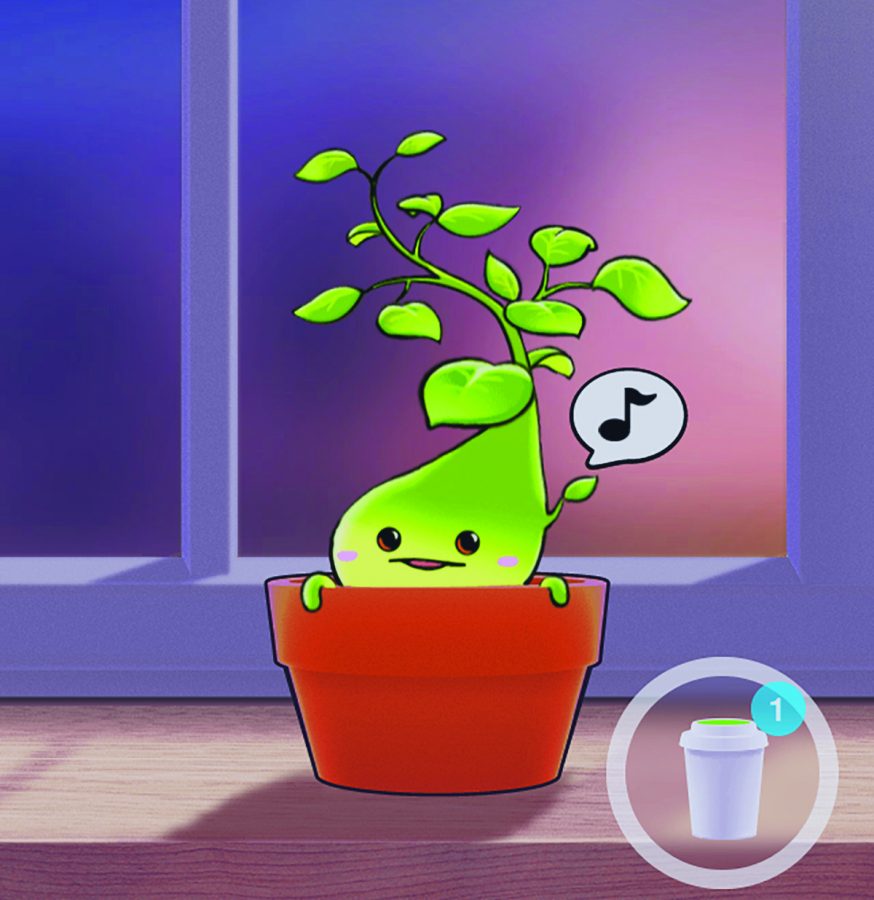Health apps can help build habits
Little sprout from Plant Nanny app exhibits calming gradients as well as a cute little smile.
March 28, 2019
There are a multitude of applications on the market that make keeping tabs on basic physical and mental health needs easier in a more health-conscious world
Certain apps help keep up with a person’s physical health, may it be to track how much water a person has drunk or how many calories someone has consumed.
Plant Nanny is a free app that helps track how much water a person has drunk throughout the day by watering an animated plant.
After asking for some basic information about the user, like weight and activity level, the app will provide its user with a variety of plants to pick from and give a name to. Plant Nanny will then tell the user to water the plant every time they drink a serving of water.
In addition to this, the app will send reminders throughout the day to drink water and water the plant.
If the user waters the plant, it grows, but if not, the plant slowly withers away and eventually dies.
Unfortunately, the app only tracks water intake at specific intervals based on the user’s personal daily requirements. For this reason, it is crucial that users measure how much water their cups and bottles are capable of holding and charting it accordingly.
MyPlate is a free calorie tracker with a large community.
Users of MyPlate have options to track caloric intake and output, as well as water consumption. The interface is simple and easy to navigate. For caloric intake, the user must simply enter the name of the food eaten and enter the portion consumed. If the name of the food is not registered in the app’s database, the barcode on the item can be scanned and follow the rest of the aforementioned process.
The process for managing caloric output is similar, look up what kind of exercise has been done, or enter it manually if it is not registered. This aspect is measured by the length and brand of physical activity, which can be modified. The app also provides users with pre-made exercise routines based on skill level and duration.
Overall, the app is great for managing what and how much someone eats and exercises. The only minor issue is that the app does not actively encourage users to keep up with their habits.
While maintaining physical health is important, it is also important for people to keep an eye on their mental health.
There are also apps made for supporting someone’s mental health, may it be by motivating someone to get certain tasks done, helping improving sleep quality and by giving people an opportunity to get away from the world for a moment via meditation.
Fabulous is a free app that helps create and promote healthy habits such as drinking water, eating a healthy breakfast and getting regular exercise. The goals start out slow and gradually increase, starting with one goal at a time and adding more on as time passes.
This is done in order to make users more inclined to keep up with their goals and to not overwhelm them.
Another app that helps improve motivation is Wonderful Day. This app acts as a virtual planner, unlike Fabulous, it allows for its users to set personal goals.
The user can set a reminder for a specific day or days and time for whatever task they wish to get done. If the user achieves the task, he or she will hit a check button and a green dot will appear on the calendar. Adversely, the user will hit a button labeled with an “X” and the app will chart it with a red dot. This dot map provides users with a visual representation of their progress, and thus encourages users to be proactive in achieving their goals.
The only advice for potential users is to set specific goals. The more generic a goal, the more difficult it will be to track. Setting more specific goals allows for steady progress and therefore a greener board. Long term goals are harder to accurately monitor, so it is best that a big project is divided up into smaller, more manageable ones.
Calm is a free app that helps soothe anxiety via meditation and promotes healthy sleeping habits. This app provides a multitude of meditation routines that are meant to lower stress, as well as sleep stories to help people fall asleep quicker.
The meditation routines are provided in weekly intervals, one session per day. The sessions average from around 15 to 20 minutes, with a few exceptions.
The main issue with Calm is that many aspects of the app are limited to whether or not the user has a membership. Without one, users are restricted to a certain number of sleep stories and meditation routines. For those who wish to avoid the $60 yearly membership, an alternative to this app would be Slumber.
Other great apps pertaining to health include apps that remind people to take medication, like Mango Health and Dosecast Medication Reminder.
Whatever problem with health someone may have, be it mental or physical, there is an app out there to help them.








